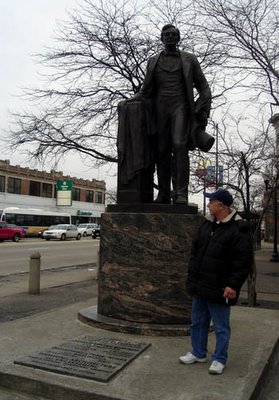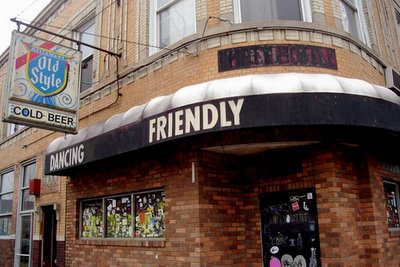Only the loyalist, loneliest readers will be online today. If you are one of those souls, here's a Christmas gift from me to you: Another extra-long, recycled Stupid Foreigner piece from my time in Japan. A continuation of last week's entry on jobs in Japan, this one is from September 13, 1998. Enjoy. And save some egg nog for me.Whew ... I'm tired.
I've just finished another long and busy and stressful week on the job. I occasionally receive very brief email messages from some of you saying you can't write more because you're too busy busting your asses at work or school. Which is fine, but maybe you don't appreciate how hard I work here in Japan. And how difficult it is to churn out page after page of senseless dribble every week. But I do it.
Some of you may be wondering just what my job is. What exactly have I been doing this past year here in Japan? Well, since you asked, I'll tell you. My job, if I can summarize it in a few words, is to speak English.
Yup. That's what I do, day in and day out. At least that was the most important requirement I had to fill before getting hired as an ENGLISH CONVERSATION TEACHER. I passed the test -- I'm a native English speaker (although that point may be debatable) -- and I was hired. Now, I show up to work for my eight hours a day, five days a week, and speak English to Japanese people of all ages and sexes.
What's so difficult about that? I'm not really sure, but when I listen to so many of my Nova Intercultural Institute co-workers whining about the injustices they suffer at the hands of their employers and the difficulties they face in speaking to students and having the students talk back, I realize this must be a really difficult job. And believe me, a lot of my fellow "conversation teachers" find the time to complain. They complain if a student is added to their lesson at the last moment. They complain if one of their students is too shy to speak during a lesson (can you imagine, a shy Japanese person?). And they complain if the accommodation their company set them up with doesn't include a bed but rather a futon.
Teachers, as a whole, are respected in Japan. (Just don't say that to the four or five junior high school teachers that have been stabbed to death by students this past year.) Students usually don't second-guess a teacher's ability or intentions. Call it trust if you want; I'll call it being gullible. What most students don't realize is that many of their English conversation teachers have no knowledge of teaching (some don't even speak English very well) and their only interest in Japanese culture is the currency they can take back home with them. Well, that, and the young ladies they can take back to the love hotel. To illustrate these points, I can tell you that in one year in Japan, I've met only three "teachers" with teaching credentials in their home countries. And now that the yen isn't as strong as it used to be, conversation schools are faced with a shortage of teachers. Yes, many of my colleagues are basically bums -- too lazy and talentless to find a job in their country, or just out of college and wanting to explore the world a little before getting a real job, or married to a Japanese girl and in need of a paycheck to hand over to her every month. Of course, there are some really good and talented teachers over here too, and if anyone I know in Japan is reading this, this is referring especially to you.
But, this is supposed to be a little humorous, so I'll stop bitching now (maybe I just needed to vent after such a long and difficult work week). So, let me get back to my original point and present you with other "People Who Would Be Unemployed in the USA."
PUBLIC ADDRESS ANNOUNCERS
I remember during my first week in Japan I was walking home one hot afternoon, hungover and tired. Besides having no names, Japanese streets have this remarkable quality of looking the same. So I was a little lost, a little confused. All of a sudden, I was thrown into a total panic. What sounded like an air-raid siren went off somewhere in the immediate vicinity. This was followed by a booming voice, calmly saying something that bounced off the surrounding hills and was totally incomprehensible to me. I listened for any words I might recognize, like "earthquake" or "tidal wave" or "take cover because North Korea is shooting long-range missiles at us" or something like that. Of course I couldn't understand a word of it, so I looked around to see how the locals were taking the news, fully prepared to follow them into the nearest bomb shelter. The thing about it was that nobody reacted to the voice. In fact, no one even appeared to be listening. So, I eventually made it home, sweating and wondering what the hell had just happened. Maybe this was the way Japan delivered the news to its people. Maybe it was just a test.
Months passed and I heard the Big Brother voice from time to time but was never able to figure it out, and no fellow foreigner was able to understand it either. Finally, one day I was with a Japanese person when the alarm went off. "What's that?" I asked. "Oh, it's difficult to explain in English," was the reply (basically, this is the reply I get to most of my questions). "Try to explain," I insisted, trying not to sound afraid. Well, after a few minutes of searching for words, my Japanese friend was able to tell me that the message was about a lost old person.
Apparently, Japanese cities use their mega-loud public address systems as a lost-and-found service. If your 101-year-old grandmother wanders off on her bicycle for more than 30 minutes, you report her missing and the giant voice describes what she was wearing and the name she answers to. If lost old people seems like a minor problem (as I first thought), you should realize that Japan now has more than 10,000 people 100 years old or older. That equals a lot of announcements.
SUPERMARKET SHOUTERS
Japan, I think, has an affinity for loud voices. Because everywhere you go, you hear giant bullhorns put to use at top volume. There are the people who help locate missing grandparents, there are the loud ones at train stations, and there are giant vans from various political parties that boom out their latest plan on how to get out of the economic slump (one plan is to build bridges over rivers where there aren't even any roads). Perhaps the most annoying shouters are the ones found at supermarkets.
If you think listening to Muzak is a pain, you should try shopping with people yelling at you. In some supermarkets, there are people who stand by the fish section and blast you with information on just how fresh the fish is, or how 50 yen per miligram is a good price. I'm not sure if it's a good price or not, because I can never figure out the metric system, but I am sure that these people scare the hell out of me. The selection of "food" in the fish department also scares me, but that's another story. I will tell you that I'll never consider a fish head a delicacy, no matter what the man with the bullhorn says.
TISSUE DISTRIBUTORS
Supposedly Japanese people are clean. They talk about their nightly baths as if they were the only ones in the world to know what a bathtub is for. They invent machines to keep them squeaky clean, like the toilet that squirts water up their bums. And when you go to a restaurant or bar in this country, you are handed a towel (hot in the winter, cool in the summer) to wipe the germs off your grimy hands.
But for some unexplained reason, Japanese people fall short in some cleanliness departments. First of all, those same restaurants and bars that give you a hot towel don't offer napkins to wipe off the natto from your chin. They also don't provide paper towels in their rest rooms (nor do those rooms have hot water). And when you are trying to figure out just what is in the little bowl the waiter dropped in front of you, you hear people all around you sniffling away because in Japan it's considered IMPOLITE to blow your nose.
So, are the Japanese really clean people? Well, maybe, depending on your definition. But apparently to make up for the lack of napkins and paper towels, there is no shortage of pocket tissues. Wherever you go, you are confronted by people handing out little packets of tissues. "Good afternoon!" they happily chirp, give you a slight bow, and hand you a packet, or two if you're lucky. "Thank you very much!" they yell after you as you keep on walking, trying to find an empty pocket for your sixth packet of tissues in the last 20 minutes.
The people distributing the tissues are usually very well dressed, much better than I am, even though I'm considered a respected professional. And they seem very happy to be standing on a street corner, or at the entrance to the train station, passing out pocket tissues. The tissues, in fact, are advertisements for various businesses, like phone sex lines or restaurants. (To be used for masturbation purposes or in place of napkins maybe?) But I can't read Japanese so it's a wasted effort on me.
And I can't honestly say what Japanese people do with all the tissues. Not to blow their noses, but they do use them. One day I brought in five packets to work, and left them out for everyone's use. That day, I was the only teacher there, and there were two Japanese staff members. At the end of the day, I hadn't used one tissue, but all five packets were gone, and the empty packets were in the trash. I didn't ask the staff members if they had called the phone numbers on the packets.
Well, those are some people who would be unemployed in America. Of course I'm included on the list, which is precisely why I'm writing to you from Japan. Briefly, I'll tell you about a few more unnecessary jobs:
MOS BURGER TRAY SERVICE PEOPLE
A Japanese rival of McDonald's hires people to holler "Good afternoon!" to you when you walk in the door. And when you leave, they rush to take the tray from your hands, so you wouldn't have to empty it into the trash can.
GAS STATION ATTENDANTS
Japan maybe has three self-service gas stations. All the other places employ at least six people to work at a time to fill your tank, wipe your windows and just stand around bowing. When you're set to go, one of them runs out into the street to stop traffic and lets you know when to go. The whole time screaming loudly.
HOSTESSES
I'm sure I'll write about this at great length sometime. There are tons of hostess bars in every city that hire beautiful women to sit with men and pour drinks for them. These places cost at least $50 an hour, and are extremely popular. At some of these places, the women dress in various costumes, like the ever popular "school girl uniform."
Well, that's it for this week. I gotta go because someone is shouting in my general direction. Maybe it's closing time. Or maybe she's just angry because I used one of those pocket tissues to blow my nose.





















































